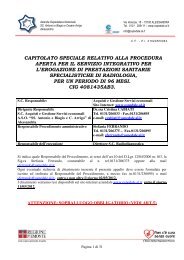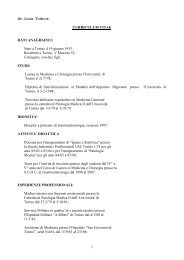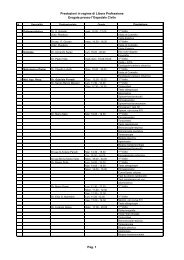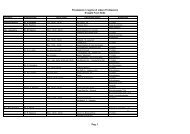Working Paper of Public Health Volume 2012 - Azienda Ospedaliera ...
Working Paper of Public Health Volume 2012 - Azienda Ospedaliera ...
Working Paper of Public Health Volume 2012 - Azienda Ospedaliera ...
You also want an ePaper? Increase the reach of your titles
YUMPU automatically turns print PDFs into web optimized ePapers that Google loves.
<strong>Azienda</strong> <strong>Ospedaliera</strong> Nazionale“SS. Antonio e Biagio e Cesare Arrigo”<strong>Working</strong> <strong>Paper</strong> <strong>of</strong> <strong>Public</strong> <strong>Health</strong>nr. 7/<strong>2012</strong>breast cancer, dietary habits, increasing life expectancy, lack <strong>of</strong> screening plan, low healthcare facilities, socio-cultural barriers, as well as traditional alternative medicine that generatesa higher mortality rate (cf. also Agarwal et al., 2011; El Saghir et al., 2011). Lakkis et al.(2010, pp. 223-224), analyzing Lebanon, find that the proportion <strong>of</strong> breast cancer is 38.2% <strong>of</strong>total cancers in women and show an interesting comparison <strong>of</strong> this country with other geoeconomicareas. In particular, in Lebanon the breast cancer is lower than US, West Europeand Israel, though is higher than Arab regional area, Iran and Malaysia. According to theseauthors the causes can be the awareness <strong>of</strong> this cancer among Lebanon women, theimplementation <strong>of</strong> screening programs and the modernization in the reproductive patters <strong>of</strong>women. Some researches claim that mammographic screening is an apt and cheap strategy todetect the breast cancer in the early stages and improves a management <strong>of</strong> this disease,though some barriers can be due to socio-economic and cultural features within developingcountries (Yip et al., 2011). Mittra (2011) argues that the most important aspect fordeveloping countries is to assure the minimum level <strong>of</strong> cancer care to these populations inorder to sharply reduce the incidence and mortality <strong>of</strong> breast cancer. In addition, other mainissues <strong>of</strong> developing countries are the higher rate <strong>of</strong> illiteracy and cultural barriers, associatedto lack <strong>of</strong> funding, health infrastructures, public health schemes <strong>of</strong> prevention, etc.Breast cancer research has also investigating the main causes across populations, consideringcultural, social and economic pr<strong>of</strong>iles. Botha et al. (2003) show that the incidence <strong>of</strong> breastcancer tends to be higher in advanced socio-economic countries in North and West Europedue to some factor risks such as “avoidance <strong>of</strong> childbearing” (p. 1727). Cogliano et al. (2005)argue that combined oral contraceptives (OCs) have been associated to an increased risk <strong>of</strong>breast cancers among users. Ursin et al. (1998) show: “breast cancer risk is elevated amongwomen with long duration <strong>of</strong> use which began at an early age. . . . before age 20” (p. 182).Oh et al. (2010), investigating the causes <strong>of</strong> breast cancer, have carried out an interestingresearch about the breast cancer seasonality. They argue that breast cancer is more diagnosedin spring and fall, this seasonality is higher across population distant from equator and thisresult is pronounced among women living in rural areas. Moreover, the overall incidence <strong>of</strong>breast cancer, over 2005-2006, increases as the latitude <strong>of</strong> population residence increases (p.233, passim). The relationship latitude and breast cancer, according to these authors may bedue to the complex season sunlight mediation <strong>of</strong> Vitamin D and <strong>of</strong> nocturnal peak level andduration. This finding could be the basis to analyze the biological rather than socialdeterminants <strong>of</strong> breast cancer patterns. Klassen and Smith (2011), instead, review with6













![[torino - 1] lastampa/urc/01 ... 26/10/09 - Azienda ...](https://img.yumpu.com/44058002/1/190x32/torino-1-lastampa-urc-01-26-10-09-azienda-.jpg?quality=85)


